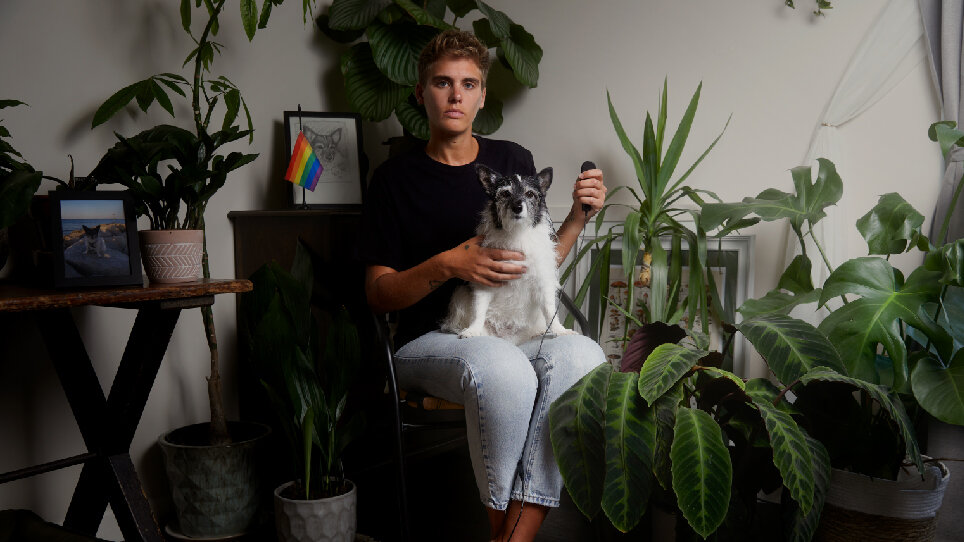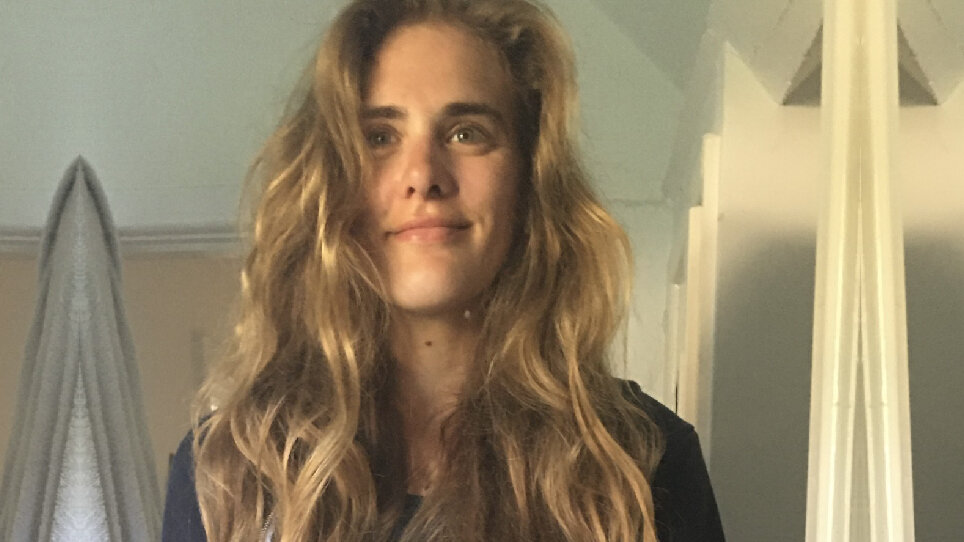Lex's story
Lex, 35, was diagnosed at the age of 30. In their full interview, below, Lex describes their love of houseplants, dogs and the outdoors. Lex explains that receiving their autism diagnosis helped them to realise they are non-binary and made them feel part of a community.
My story
Being in this space for the campaign portrait is important to me because having a lot of green around me is where I feel most comfortable. I spent the majority of my life outside in nature walking all my dogs I’ve had over the years and that's where I feel most at peace with myself. I can process all my thoughts. There's space for me to think and walk off anger or stress or sadness. Having the green around me makes me feel like the outside is sort of inside with me.
I wanted to take part in this campaign because I felt so alone for so long. I've felt not seen for the majority of my life. Being able to do this, and for the National Autistic Society to read what I wrote in my response to the call-out and pick me, made me feel seen, finally. I’m so emotional, because I'm nearly 36 and I feel like a lot of my life has been wasted or missed. Being able to talk about what I've been through, what it's like now as someone who’s late diagnosed, is really important. It brings up a lot because I felt so lonely for so long. It's been really hard.
I'm still working out the differences that I found when I was diagnosed autistic. There are so many, but I think the biggest thing was looking back on my life, my childhood and school especially, and my relationships with people.
It helped me make sense of it: why I couldn’t learn the traditional way in school; why I was behind on things; and why I was picked on, in a way, as a pretty vulnerable sort of kid.

And even as a person in my twenties and even very early thirties, who's always been really vulnerable. And it made me see, like: ‘Wow, okay, there’s nothing fundamentally wrong with me.’ Because that’s what I always felt.
My diagnosis also made me feel like I was part of a community. I always knew in my gut, even as a kid, there was something different. And obviously I just didn't have the language or any representation anywhere, for me to know what that was. It's time people like us had a voice and are seen.
"My diagnosis also made me feel like I was part of a community."
I get really passionate about it. For me, being able to talk about it is very important. It needs to come out. I've been carrying it around for too long and I'm ready to take the next step: being productive with it and using it, instead of it feeling like a hindrance. Like, my autism is great. I'm so good at so many things.
"At my diagnosis I was 30 and during the test assessment I had to do for it I was essentially treated like a young boy and it just didn't feel right."
It's really important to challenge the stereotypes. I can only speak of my experience, but at my diagnosis I was 30 and during the test I had to do for it I was essentially treated like a young boy and it just didn't feel right. They just gave me loads of toys to play with and they were like trucks or boats or cars or dinosaurs.
And they gave me some magazines and asked me which I would pick; none of them I'd be interested in, about fishing or tractors and stuff. And they asked me to pretend to make a cup of tea. It was very childlike and very boy-orientated and I'm amazed I got the diagnosis, to be honest.
It's important to challenge stereotypes because we know women and non-binary people and people of any gender can be autistic and the spectrum is so vast. It’s still new to a lot of people knowing about that spectrum and all the different presentations you can have. You could be really intense at one part of that spectrum and then not so much in another.
"It's important to challenge stereotypes because we know women and non-binary people and people of any gender can be autistic and the spectrum is so vast."
Like, there are loads of things I can do, that I know – from online mainly – other autistic people cannot do at all, but I excel in; and they can do things that I literally couldn't even think about doing. But I think especially the gender stereotype of autism is hugely important to break down.
And, for me, another layer to that is being non-binary. Having to explore that part of it on top of autism is just another huge thing to work through.
Most of my life I was projecting as a woman and perceived as a woman and it's only the last three years where it's totally blown up and I’ve gone, ‘Oh my god, this isn't how I feel. This isn't right.’ And I always knew it wasn't right. There were so many red flags throughout my whole life.

It’s only in the last year and a half I've been living as I am now. I do see a lot more things about autism related to women, which is great, but there is nothing really about non-binary autistic people. Many autistic people are on the queer spectrum as well. That's a huge amount of people and it does need to be explored and spoken about more, so people can understand themselves better.
"I do see a lot more things about autism related to women, which is great, but there is nothing really about non-binary autistic people."
I wanted to take part in this campaign because I felt like it was time for me. The whole experience is so emotional because it's being seen, isn’t it? You [the interviewer] are aware that I am autistic, so you're taking the time to allow me to have space and not rush me. This is just so new. I've never felt like this: just being respected. That's what it feels like. I can't cope with it because I'm not used to it, which is sort of sad, because I’m nearly 36. I’ve never felt like someone is asking: ‘Are you okay? Is this alright for you?’ I've just gone along with it. I think a lot of autistic people probably feel like that.

It's hard when you do finally talk about your autism and you let people in. I don't like saying ‘coming out’ because that doesn't sit right. You're letting people into your world rather than coming out to theirs. Letting people in is a really vulnerable place to be and it does pay off the majority of time because you find the right type of people, your tribe. But it's still really hard. And at the same time, it's a sadness that comes along with that because of the grief of not being able to have that to start with. Imagine if all autistic people just had that to start with. I mean, the world would be amazing. It really would be amazing.
It feels painful looking back sometimes and, currently, that's what I'm looking at in therapy: grief for the person I could have been; that kid could have had a much nicer childhood, and my teenage years were horrendous. And that is just such a sad loss. And it's still happening now for so many kids. What I would want to say to my inner child is, ‘Thank you. Thank you for being strong enough to hold on and endure everything we went through’, because it was really hard and there were a lot of times that I probably just wanted to give up and my younger self didn't, and I think that took a lot of strength.
"What's becoming one of my special interests now is essentially my own mental health. I know I have a voice in me that is desperate to come out."
It did feel like a huge step telling people about my gender, and being booked in for top surgery at the end of this year to change my chest to be more aligned with how I feel inside. I feel like I’m really putting myself out there, and in some ways that’s really good and in some ways it’s not, with the reactions from some people. I feel like this is the start of something that could be really good, to make up for things that I just didn’t have growing up.
"I hadn’t seen many stories like mine and having the autism diagnosis helped me realise I am non-binary. I'm trying to get to a place where I know myself better."
When I realised there were people like me, I felt relief. It put me on the path to diagnosis and learning more about who I am as an autistic person. I hadn’t seen many stories like mine and having the autism diagnosis helped me realise I am non-binary. I'm trying to get to a place where I know myself better. I think if someone sees themself in somebody else, that makes them feel seen and heard and included. And those are really important things for autistic people, because you spend a lot of life never feeling like that ever.
If someone could see my story and be like, ‘wow, okay, I relate to some – or none – of those things,’ whatever it is, but it helps them, then that's great. If that had been me as a kid or a young person or a young adult, seeing myself reflected back at me, I wouldn’t have had to wait to get to this point in my life, I would have been able to do things a lot sooner. And that can save some people's lives, which I think is really, really important.
